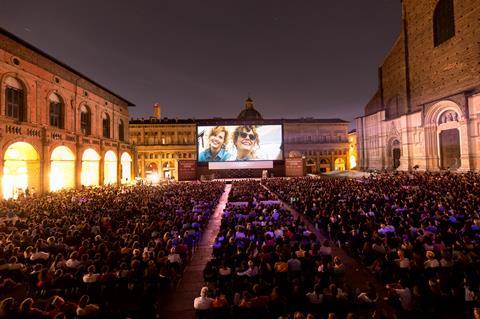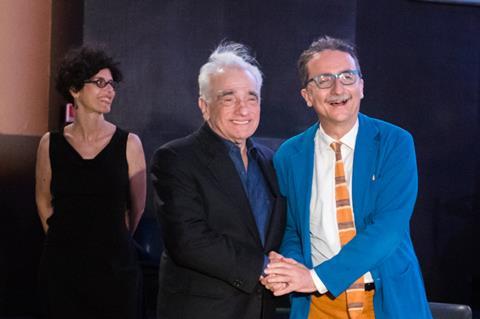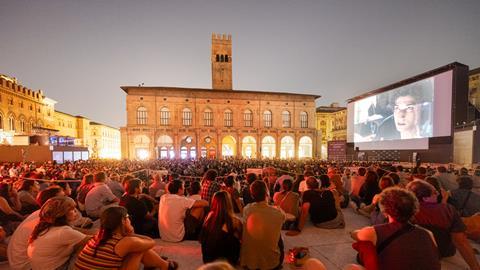The festival, which boasts Wes Anderson, Alexander Payne and Thierry Frémaux as regulars, runs from June 21-29 in Bologna, Italy.
It’s quite a sight: thousands of people crowded into one of Italy’s most graceful Renaissance squares, Piazza Maggiore in Bologna, all gazing towards a 10-metre-high screen. Some are seated, others standing or perched on the steps of San Petronio cathedral.
They are not gathered to see the latest blockbuster, but to watch films that this year will include Sergei Eisenstein’s 1925 silent feature Strike and Coline Serreau’s French comedy Three Men And A Cradle from 1985. Welcome to Il Cinema Ritrovato – the festival that was the first to prove that there’s a huge audience for ‘old’ films, if the conditions are right.
Running this year from June 21-29, Il Cinema Ritrovato began in 1986 as a five-day symposium about film conservation organised by the Cineteca di Bologna, one of the world’s most important film archives and restoration laboratories. Its transformation from a niche player to one that in 2024 saw a total of 130,000 admissions has been gradual but inexorable. Today, among events dedicated to classic cinema, only the Lumière Festival in Lyon, launched in 2009 by Bertrand Tavernier and Thierry Frémaux, attracts similar numbers.

Gian Luca Farinelli has guided Il Cinema Ritrovato since its earliest days (today he is one of four co-directors of the festival). In 2000, he also became director of the Cineteca. He puts the festival’s success down to a series of factors.
“Of course it’s summer in Bologna, which has always been a very welcoming and culturally vibrant city,” he says, but also points out that for an event like this, building a reputation is key: “We cut no corners when it comes to quality or depth of research.”
The mesh between festival, film archive and laboratory is also invaluable, Farinelli believes, as “it means that we not only get to programme most if not all of the year’s most significant film restorations, but are able to cultivate a loyal local audience with our year-round screenings and other events”.
At the festival, this loyalty extends to a band of international cineastes (from 72 countries in 2024) who return year after year. This means Il Cinema Ritrovato can afford to be pass-only – a formula more commonly associated with music festivals. (Passes are currently pegged at €140 full-price and give admission to all events and screenings via online booking.)
Filmmakers too, Farinelli says, often end up getting hooked after a first visit. “Alexander Payne never misses a chance to come back,” he comments, “and Wes Anderson is a regular. But I think the guest that most surprised me was Godard. When we invited him in 2011, it was all hugely complicated at the beginning, almost impossible. Then he came, and he loved it. The celebratory mood caught him by surprise.”
Global partnerships, cordial rivalries
Over the years, Il Cinema Ritrovato, the Cineteca di Bologna and restoration lab L’Immagine Ritrovata have forged global partnerships with film archives, studios, distributors and, more recently, streaming platforms.

“I’d single out The Criterion Channel as the one that in the last 15 years has been an essential partner for us in terms of programming,” Farinelli says.
“But studios like Paramount, Disney, Warner Bros and Sony have presented important restorations, and Martin Scorsese’s World Cinema Project has been a fundamental partner in helping us to showcase small ‘forgotten’ films from areas with limited resources for film preservation.”
Farinelli claims to have a cordial rapport with other festival directors – helped, he says, by the fact that “although there’s a certain competition for premieres of classic films or documentaries on cinema, it’s not comparable with the rivalry over new films. I can’t recall a single title that we were desperate to present in Bologna that went to, say, Venice instead”.
Thierry Frémaux, director of both the Lumière classic film festival and the Cannes Film Festival, is a frequent guest of Il Cinema Ritrovato, where on June 24 he will once again participate in an on-stage conversation with Farinelli, this one dedicated to ‘New Creation, New Audiences’.
In 2013, the festival launched its own theatrical distribution arm, ‘Il Cinema Ritrovato. Al Cinema’. It has so far brought almost a hundred restored classics to a core network of around 50 cinemas across Italy. Titles have been licensed thanks to collaborations with studios or classic cinema specialists like Park Circus, and distributed sometimes solo, sometimes via partnerships with Italian companies such as BIM, iWonder and, as in the case of its 2025 slate of restored David Lynch films, Lucky Red.
Farinelli believes that the initiative has helped to change perceptions both among exhibitors and audiences. “We’re not yet as advanced as France in this respect,” he says, “but in the last ten years, something that seemed a bit crazy – programming a classic film in a first-run venue – is now seen as normal.”
Among the titles Farinelli is most proud of having secured for this year’s edition of Il Cinema Ritrovato, he lists the new Sony-Columbia 70mm restoration of Close Encounters Of The Third Kind, which will be presented on Saturday, June 21, the festival’s opening day, in Piazza Maggiore. Also delighting the huge Piazza Maggiore audience will be Indian epic Sholay, presented in a restored director’s cut on Friday, June 27, to celebrate its 50th anniversary.
Away from the square (where admission is free, with no pass required), Farinelli highlights retrospectives of US director Lewis Milestone and Italian filmmaker Luigi Comencini; a survey of the groundbreaking features made by Ukrainian studio VUFKU in Odessa between 1924 and 1929; and a British B-movie that was sent to the festival by the BFI in London that the festival director admits he had never heard of before.
“It’s called Strongroom, directed in 1962 by Vernon Sewell, and it’s extraordinary – a masterful example of how to keep an audience glued to their seats for 80 minutes.”
Asked how he would sum up the spirit of a festival which is now in its 39th year, Farinelli replies: “What Il Cinema Ritrovato tries to do, every year, is to bring people back to that moment when they discovered cinema, where every screening was somehow mythical and unique. It’s about going back to the origins and the purity of our passion for film.”


























No comments yet